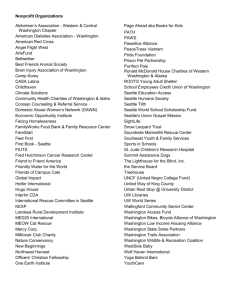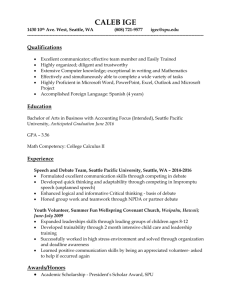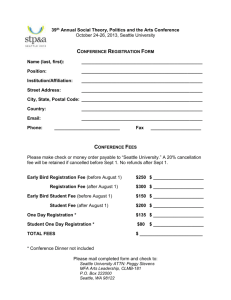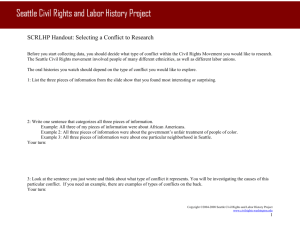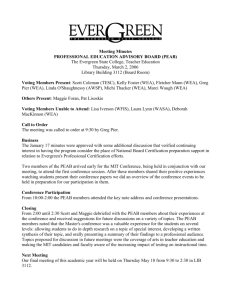Adding Teacher Educators to the Professional Educators Standards
advertisement
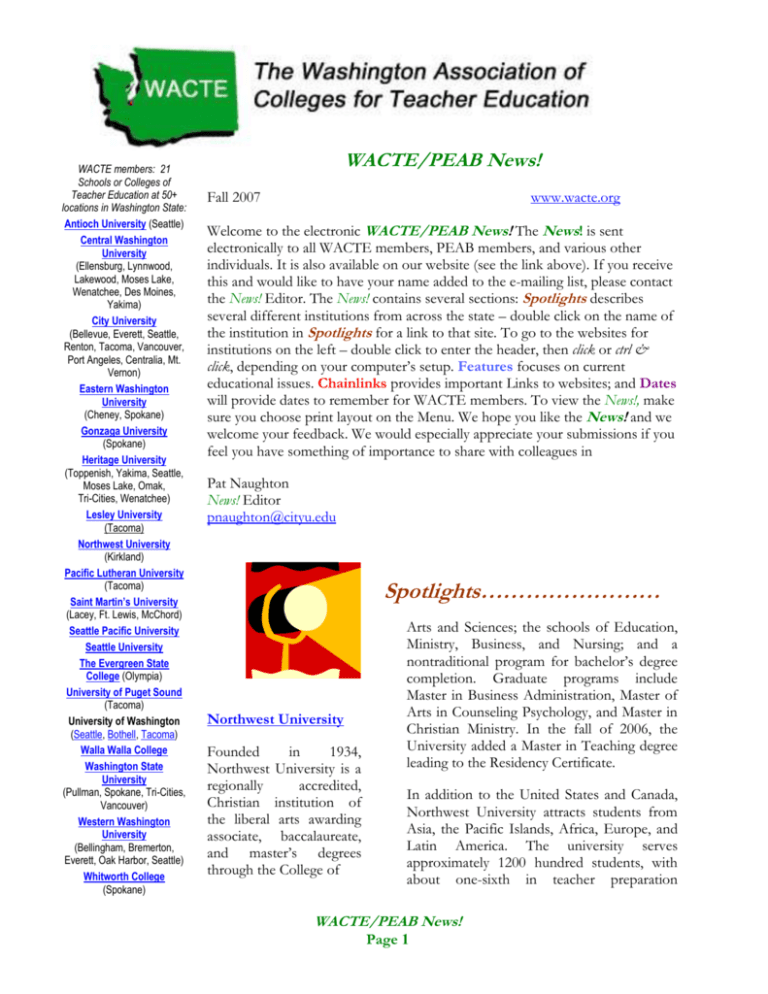
WACTE members: 21 Schools or Colleges of Teacher Education at 50+ locations in Washington State: Antioch University (Seattle) Central Washington University (Ellensburg, Lynnwood, Lakewood, Moses Lake, Wenatchee, Des Moines, Yakima) City University (Bellevue, Everett, Seattle, Renton, Tacoma, Vancouver, Port Angeles, Centralia, Mt. Vernon) Eastern Washington University (Cheney, Spokane) Gonzaga University (Spokane) Heritage University (Toppenish, Yakima, Seattle, Moses Lake, Omak, Tri-Cities, Wenatchee) Lesley University (Tacoma) Northwest University (Kirkland) Pacific Lutheran University (Tacoma) Saint Martin’s University (Lacey, Ft. Lewis, McChord) Seattle Pacific University Seattle University The Evergreen State College (Olympia) University of Puget Sound (Tacoma) University of Washington (Seattle, Bothell, Tacoma) Walla Walla College Washington State University (Pullman, Spokane, Tri-Cities, Vancouver) Western Washington University (Bellingham, Bremerton, Everett, Oak Harbor, Seattle) Whitworth College (Spokane) WACTE/PEAB News! Fall 2007 www.wacte.org Welcome to the electronic WACTE/PEAB News! The News! is sent electronically to all WACTE members, PEAB members, and various other individuals. It is also available on our website (see the link above). If you receive this and would like to have your name added to the e-mailing list, please contact the News! Editor. The News! contains several sections: Spotlights describes several different institutions from across the state – double click on the name of the institution in Spotlights for a link to that site. To go to the websites for institutions on the left – double click to enter the header, then click or ctrl & click, depending on your computer’s setup. Features focuses on current educational issues. Chainlinks provides important Links to websites; and Dates will provide dates to remember for WACTE members. To view the News!, make sure you choose print layout on the Menu. We hope you like the News! and we welcome your feedback. We would especially appreciate your submissions if you feel you have something of importance to share with colleagues in Pat Naughton News! Editor pnaughton@cityu.edu Spotlights…………………… Northwest University Founded in 1934, Northwest University is a regionally accredited, Christian institution of the liberal arts awarding associate, baccalaureate, and master’s degrees through the College of Arts and Sciences; the schools of Education, Ministry, Business, and Nursing; and a nontraditional program for bachelor’s degree completion. Graduate programs include Master in Business Administration, Master of Arts in Counseling Psychology, and Master in Christian Ministry. In the fall of 2006, the University added a Master in Teaching degree leading to the Residency Certificate. In addition to the United States and Canada, Northwest University attracts students from Asia, the Pacific Islands, Africa, Europe, and Latin America. The university serves approximately 1200 hundred students, with about one-sixth in teacher preparation WACTE/PEAB News! Page 1 programs. Teaching candidates prepare for the Residency certificate in eleven endorsements: elementary education, health and fitness, social studies, English/language arts, biology, mathematics, choral music, general music, instrumental music, theatre arts, and English as a second language. Northwest University commits faculty and resources to support the proposition that “Every child taught by a graduate of the Residency Certificate program enjoys the right to have a competent, highly trained teacher from the first day of service.” To that end, the School of Education provides learning experiences in professional and content area courses and extensive application in the classroom, which equip candidates for the demands of public and private education, kindergarten through the twelfth grade. The teacher preparation program demands that its students commit to a work ethic centered on community service and the educational needs of each child. This commitment builds upon Christian values important to our learning community and upon civic principles important to society. Moral and ethical values are highly prized, and commitment to fairness, justice, equal opportunity, inclusiveness, and the consideration of others are deemed essential qualities for those who aspire to serve the community and its children. Seattle Pacific University Located on the north slope of Queen Anne Hill in Seattle, SPU has about 3,900 students total. About 800 are graduate students and the rest are undergraduate students. The School of Education offers Residency certification through undergraduate and graduate programs with about 120 students per year being recommended. It also offers principal and superintendent certification programs with about 30 principals and 15 superintendents recommended per year. The school counseling program recommends about 15 students per year for certification. SPU also has degree programs in Curriculum and Instruction at the masters level (M.Ed.) and a doctor of education program (Ed.D.). The professional certification program (pro-cert) is very large with about 1500 students in the program at some point. SPU has recommended more than 12,000 candidates for certification since the founding of the School of Education SPU is well known for its Christian identity. One of the few Christian universities in an urban area, the vision of SPU is to “Engage the Culture and Change the World.” The strength of this vision comes directly out of the commitment to social justice prominent in its Wesleyan heritage. SPU is also known for its partnerships, including more than 20 partnerships with districts and Educational Service Districts across the entire state serving the pro-cert program. In addition, on-campus programs have partnerships with Dearborn Park Elementary in the Seattle School District and Zion Prep Academy. International partnerships through the International Center for Curriculum Studies provide interactions with schools in Guatemala, Russia, China, and Spain. These opportunities for travel can enrich the lives of our professional education candidates whether graduate or undergraduate students. Another important aspect is the sense of community as faculty work collaboratively with their students on teaching, research, and service projects. Partly because of its size, SPU faculty know their students and treat them as individuals offering careful custom academic and individual advice. Seattle University One of 28 Jesuit Catholic universities in the United States, Seattle University draws upon WACTE/PEAB News! Page 2 the Jesuit educational philosophy to develop critical thinkers and compassionate leaders. In fall 2005, there were 7,061 enrolled at Seattle University of which 569 were graduate students in the College of Education. Enrollment in professional education programs was 402. The College of Education houses the 11 graduate programs, including 9 professional educator programs: Teacher Education, Curriculum and Instruction, Educational Administration, Counseling, Literacy for Special Needs, Special Education, School Psychology, Student Development Administration, Adult Education, Teaching English as A Second Language and Educational Leadership. Needs is the only reading program in the state focused on special needs students. The School Psychology program offers coursework in serving Hispanic students, which includes a month of study and field experience in Mexico. Educational Leadership, a cohort-based program, recruits applicants from higher education, K-12 education, medical and health services, for-profit-business, not-for-profit services and consulting. The Master in Teaching (MIT) program, a team-taught program, enables students to earn a master in teaching degree and initial teaching certification within four academic quarters. Students have multiple field experiences including placement in partnership schools in the Seattle and Shoreline School Districts. MIT students may also choose to earn the endorsement in special education through six quarters of study. The programs in Literacy for Special Needs, Special Education, School Psychology, and School Counseling share faculty and courses across their programs. Students may pursue dual degrees and dual certification in School Counseling and School Psychology. The Educational Administration program offers mentors to every graduate serving in a high need school. The Evergreen State College All of the programs include a demonstration of positive impact on student learning. For example, MIT candidates in special methods classes design an instructional unit to teach to their internship class, select a sample of diverse learners within that class, design a pretest and posttest on the unit’s learning targets, and assess the impact of their teaching on the learning of the student sample. The Evergreen State College (TESC) serves approximately 102 students in professional educator programs annually, 88 in Master in Teaching (MIT) and 14 in Professional Certificate (ProCert). It is the higher education partner of Lincoln Elementary, Olympia, one of the founding members of The League of Small Democratic Schools. TESC's MIT Program (residency certification) and ProCert Program (advanced certification) both explore the central question: “How can public education meet the needs of the diverse peoples who live in this democracy?” The programs stress understanding and skills in cultural sensitivity and advocating for the diverse needs of all students. The MIT program embraces a theme of “Developing teachers who can put principles of effective and meaningful classroom teaching into practice, and who can create classrooms that are culturally responsive and inclusive, democratic and learner-centered, developmentally appropriate and active.” The MIT program is a two-year, full-time, The Special Education program's major emphasis is on children with learning and behavioral disabilities from diverse linguistic and cultural backgrounds. Literacy for Special WACTE/PEAB News! Page 3 interdisciplinary professional preparation program. teacher prepare educational leaders and school administrators, teachers, school psychologists and special education teachers. The School of Education offers the following programs (average number of students graduated each year in parentheses): Principal Preparation – Danforth (29), School Psychologist (30), Leadership for Learning – School District Leaders (25), Early Childhood Special Education (30), Emotional/Behavioral Disabilities (16), Elementary/Secondary Teacher Education (60/60), Learning Disabilities (18), and Moderate/Severe Disabilities (12). MIT Approach Integrated – Faculty team from multiple disciplines provides a fully integrated learning experience rather than separate courses Reflective – Intensive thinking, critical reading and writing required throughout the program and master’s project Collaborative – A community of learners developed (45 students annually), with many group activities Field intensive – One day a week in the schools in year one, two full-time student teaching experiences during year two including one in a diverse, urban setting Performance-based – performance and portfolios assessed continually and documented in narrative transcripts UW Seattle operates a wide variety of programs designed to provide a continuum of learning opportunities for professional educators at the graduate level. Each of these programs represents an effort to bring the resources of the public research university to bear on educational problems of importance to the communities of Washington and to the nation. UW Seattle programs are organized around the following values and principles: The MIT Program develops effective teachers who can assume leadership roles in curriculum development, child advocacy, assessment and anti-bias work. The placement rate for 2003 graduates was 81%, the best among all teacher education programs in the state. The 2004 placement rate was even stronger at 86%. MIT received the 2003 Richard Wisniewski Award by the Society of Professors of Education in recognition of outstanding contributions to the field of teacher education. Educators, especially classroom teachers, must have strong subject matter knowledge to prepare P-12 students effectively to understand and participate in “real world” activities related to the academic disciplines such as mathematics, history, science, and literacy Educational decisions should be grounded in knowledge from contemporary research, drawing on multiple sources of evidence (not single test scores) as a context for decision making at every level Education should be understood not simply as a technical matter, but as a moral endeavor in which both fundamental goals and the means for achieving them command ongoing community debate and deliberation University of Washington (Seattle) The University of Washington, Seattle serves 39,251 students. Eleven thousand of these students are at the graduate level—and all of the University’s programs for professional educators are graduate programs. UW Seattle College of Education has programs, which WACTE/PEAB News! Page 4 UW Seattle programs for professional educators share with other WACTE institutions a strong commitment to increasing the diversity of the professional education workforce, including teachers, school psychologists, special educators, and administrators and to develop new knowledge, useful for programs and practitioners around the state and nation. This twin investment in research and teaching permits the University to contribute new ideas and practical techniques which address issues and needs such as those for new instructional approaches for teachers in math and science, improved techniques for teaching children who are learning English, more effective early intervention programs for children who have autism or other disabilities, and many others. The rich investment of state and private resources in UW Seattle faculty and programs allow it a unique capacity both to prepare prospective teachers and educational leaders Features The Features for this edition include a commentary from WACTE’s President and a recent PESB action in response to an out-of-state provider. Future editions will cover topics of current interest or current news in the education field. We welcome all ideas and suggestions! President’s Corner Many issues are coalescing around teacher education this fall. Major initiatives in mathematics education, redefinition of elementary endorsement requirements, music endorsements controversy, implementation of the new Standard V, concerns about out-ofstate providers, development of a legislative agenda, continued concern about how professional educators are prepared, etc. etc. I’m sure that I missed some important issues. Just keeping track of them is difficult; responding in a coherent fashion and presenting our own initiatives sometimes seem very daunting. Frankly, it seems like a struggle; sometime I wonder if it is worth it! One of the things that contributes to that sense of discontent with the job is a focus that is too narrowly on “compliance” issues. That is where I live much of my professional life! The accreditation questions for my area of responsibility are always pressing! How can we demonstrate our endorsement competencies so that the state is satisfied? How will we structure our programs to help students demonstrate their competence? Can we find a way to get an extra PEAB meeting? WACTE/PEAB News! Page 5 Sometimes it seems like the most pressing issues focus on meeting the letter of the law. It’s kind of interesting to me that I floundered in this state of discontent and almost depression as long as I did before I realized that others had struggled with similar issues! St Paul nearly 2000 years ago articulated my thinking when he said “. . . by dying to what once bound us, we have been released from the law so that we serve in the new way of the Spirit, and not in the old way of the written code.” (Romans 7:6). To me, that means that we should lift our eye from the letter of the law and focus on the spirit behind the law. So what does that mean in the context of professional education? Does that mean we ignore the letter of the law? Of course not! If we do, in this situation we run the risk of losing our accreditation! To me, trying to “…serve in the new way of the Spirit…” means that we must go beyond the law. In a way, the letter of the law is the starting place – a necessary but insufficient requirement for a good professional education program. We must figure out what the spirit behind the law is and build our programs to serve that end. So what are some practical suggestions for discerning the spirit of the law? Getting back to the basics has served to refocus some of my thinking. Here are some specific topics for reflection that have served to refocus my attention: Remembering why I entered this field (hint—it wasn’t for money!) Asking others why they want to be or are professional educators Remembering important professional educators in my life Thinking about professional educators that I admire (some of you are in my mind!) Working with students on practical problems, but also asking them why they want to serve as a professional educator So, here’s the irony in the situation. I have actually found hope and meaning by doing more than is required! By seeing the law as a minimum rather than the ultimate requirement, I find myself liberated to do what I believe is really important. Frank Kline, President PESB Letter to Grand Canyon University On December 3, 2007, PESB sent a memo to Washington state Superintendents and personnel Directors and a letter to Grand Canyon University regarding the latter’s representation of their teacher education offerings. PESB expressed concern over Grand Canyon’s misrepresentation of their status as a provider of programs approved by the state of Washington for “…licensing, certification, and added endorsement to … existing credentials.” Course offerings by out- of –state institutions, which do not adhere to Washington state requirements, has been an ongoing concern for WACTE institutions. In this case, Grand Canyon’s solicitation of educators in the Mukilteo School District came to the attention of the PESB, resulting in a quick response. To view PESB’s memo to Superintendents and Personnel Directors, letter to Grand Canyon, and Grand Canyon’s solicitation effort, see the PESB web site. WACTE/PEAB News! Page 6 Chain Links: Linking us together to improve the education for all children… American Association of Colleges of Teacher Education http://www.aacte.org Association of Washington School Principals http://www.awsp.org National Council for Accreditation of Teacher Education http://www.ncate.org/ Office of Superintendent of Public Instruction http://www.k12.wa.us/ Professional Educator Standards Board http://www.pesb.wa.gov/ Teacher Education Accreditation Council http://www.teac.org/ Washington Association for Colleges of Teacher Education http://www.wacte.org/ Washington Education Association http://www.washingtonea.org/ Washington State Board of Education http://www.sbe.wa.gov/ Washington Association of School Administrators http://www.wasa-oly.org/ Dates to Remember OSPI 15th Annual January Conference Spokane Convention Center Spokane, WA January 29, 30, and 31, 2008 WACTE Calendar January 16-17, UW Tacoma April 23-24, Heritage University See WACTE Calendar for additional meeting dates 2008 - 2011 PESB Upcoming Meetings January 16-17, Comfort Inn, Tumwater, WA March 19-20, Red Lion Hotel, Sea-Tac, WA WACTE/PEAB News! Page 7

